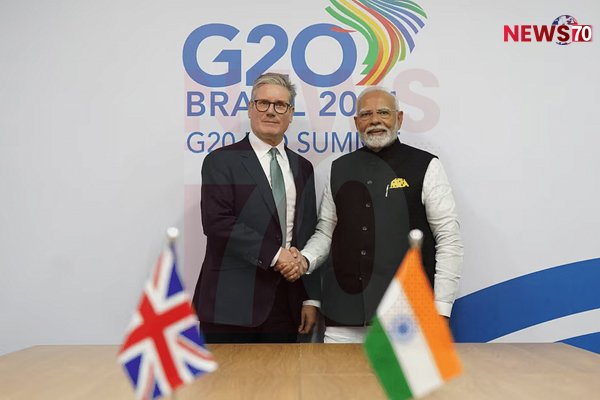India and the UK are set to sign a landmark free trade agreement during Prime Minister Narendra Modi’s UK visit, after three years of negotiations. The deal will cut India’s tariffs on British exports—slashing Scotch whisky duties from 150% to 75% immediately (eventually to 40%) and reducing car duties from 100% to 10% under a quota system. In return, the UK will grant duty-free access to 99% of Indian exports, including textiles, electric vehicles, and engineering goods. Valued at boosting the $55 billion bilateral trade relationship, the pact is expected to create major opportunities for Indian exporters and strengthen economic, diplomatic, and strategic ties. The agreement still requires approval from both countries’ legislative bodies before implementation.
India and the United Kingdom are set to sign a landmark free trade agreement this Thursday during Prime Minister Narendra Modi’s visit to the UK, officials confirmed. The agreement, which comes after three years of intermittent negotiations and was finalized in May, aims to significantly enhance bilateral trade by dismantling numerous tariff and non-tariff barriers, thereby providing expanded market access for both nations.
As part of the deal, India will reduce tariffs on key British exports such as Scotch whisky, automobiles, and selected food products. Specifically, tariffs on Scotch whisky will be slashed from 150 percent to 75 percent immediately, with a gradual reduction to 40 percent over the next decade. Duties on cars will be cut from a steep 100 percent to 10 percent under a quota system that will be progressively liberalized. In exchange, the UK will grant duty-free access to Indian textiles, electric and hybrid vehicles, and other products, with 99 percent of Indian exports to the UK benefiting from zero tariffs, according to Indian commerce ministry officials.
The pact, which still requires approval by the British Parliament and India’s federal cabinet—expected within the next year—marks a pivotal milestone in strengthening economic ties between the two countries. Trade Minister Piyush Goyal will accompany Prime Minister Modi for the formal signing ceremony.
“This is a significant agreement that reflects our commitment to deepening bilateral cooperation,” said Vikram Misri, India’s foreign secretary. Misri noted that legal vetting of the deal is nearing completion ahead of Modi’s four-day visit, which also includes a stop in the Maldives. During the visit, Modi is scheduled to hold high-level discussions with UK Prime Minister Keir Starmer on a broad agenda encompassing trade, energy, security, health, and education, alongside meetings with prominent business leaders.
Bilateral trade between India and the UK reached $55 billion in the fiscal year 2023/24, with the UK emerging as India’s sixth-largest foreign investor, boasting cumulative investments close to $36 billion. Around 1,000 Indian companies operate in the UK, employing approximately 100,000 people, with total investments estimated at $20 billion, underscoring the depth of economic interconnection.
Industry experts anticipate the trade deal will unlock significant opportunities for Indian exporters, particularly in sectors such as textiles, footwear, marine, and engineering products. Ajay Sahai, Director General of the Federation of Indian Export Organisations, emphasized that the pact will boost market access and promote growth in these key industries.
Under the agreement, Indian electric and hybrid vehicle manufacturers will gain quota-based access to the UK market, signaling a move towards greener trade practices. Both governments are expected to continue collaborating on trade facilitation measures to ensure smooth implementation.
This deal is widely viewed as a stepping stone towards more comprehensive economic integration between India and the UK, potentially paving the way for future agreements that address services, investment, and regulatory cooperation. The signing of this agreement during Modi’s visit also highlights the strengthening diplomatic and strategic partnership between the two democracies in a rapidly evolving global landscape.
